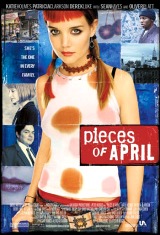|
Pieces of April
Question & Answer with
Peter Hedges and Cast
Feature and roundtable interviews by Dominic
Varle
|
| |
|

|
USA, 2003. Rated PG-13. 80 minutes.
Cast: Katie Holmes, Patricia Clarkson,
Derek Luke, Sean Hayes, Oliver Platt, Alison Pill, John Gallagher Jr,
Alice Drummond, Sisqo
Writer: Peter Hedges
Original Music: Stephen Merritt
Cinematography: Tami Reiker
Producers: John Lyons, Gary Winick, Alexis Alexanian
Director: Peter Hedges
LINKS
|
 aving
fled the suburbs for the Big City, April (Katie Holmes) is the black sheep of
her family. Estranged from her dying mother, the ironically named Joy (Patricia
Clarkson), April offers to host Thanksgiving at her scruffy New York apartment.
Her father, Jim (Oliver Platt) seizes this olive branch, knowing that this Thanksgiving
may be their last together, and brokers a détente between the two. Writer/director
Peter Hedges posits April frantically trying to cook the turkey in an oven that
doesn't work while her family drives in from the 'burbs. Cutting between these
narratives (and adding a distracting and largely redundant third involving April's
boyfriend Bobby, played by Derek Luke) reinforces Hedges' race against time
theme.
aving
fled the suburbs for the Big City, April (Katie Holmes) is the black sheep of
her family. Estranged from her dying mother, the ironically named Joy (Patricia
Clarkson), April offers to host Thanksgiving at her scruffy New York apartment.
Her father, Jim (Oliver Platt) seizes this olive branch, knowing that this Thanksgiving
may be their last together, and brokers a détente between the two. Writer/director
Peter Hedges posits April frantically trying to cook the turkey in an oven that
doesn't work while her family drives in from the 'burbs. Cutting between these
narratives (and adding a distracting and largely redundant third involving April's
boyfriend Bobby, played by Derek Luke) reinforces Hedges' race against time
theme.
Pieces of April is an understated story
"about the preciousness of time," according to Hedges. Hedges, whose short résumé
is long on acclaim (he also wrote What's Eating Gilbert Grape? and About
a Boy), makes his directorial debut with the independent April.
Originally slated to cost in the region of seven million dollars, but made in
the end for just three hundred thousand after the production budget fell through
several times, it's rather difficult to see where the balance could have made
this simple film, simply told, any better than it is. Despite several faltering
steps, Pieces of April is so littered with moments of true humanity that
the film is ultimately irresistible.
Written as a tribute to Hedges' mom, who died
three years ago, Pieces of April appealed to the four leads (Holmes,
Clarkson, Platt and Luke) for the same reason. In Derek Luke's words, "These
characters are real, and roles like this don't come along that often."
That the cast and crew worked only for a percentage of the box office, and the
gusto with which the actors tackle their roles, speaks volumes to their commitment—and
the paucity of credible scripts in circulation.

Katie Holmes in Pieces
of April |
In New York, Hedges and members of the cast sat
down with reporters to discuss the inspiration for Pieces of April, the
economics of the "studio system," and why it's probably a good idea to give
Marilu Henner's recipe for tofu meatloaf a wide berth. What follows are highlights
from those interviews.
Question: Is it true that your inspiration
for Pieces of April came from your own situation with your mom?
Peter Hedges: I made my first notes for
it eight or nine years ago, but I didn't start the script until I found out
my mom was sick. I didn't feel like writing [at that time], even though Mom
insisted that I carried on. When I went back and found my notes for April,
I'd forgotten that the mother character has cancer. So I called my mom and told
her that, and she said "that sounds like a story you should write."
I wanted to be her son when she was dying—I
didn't want to be a writer taking notes. Afterwards, I wanted to make something
with meaning out of Mom's situation, [to show] that I'd learned things from
someone who wanted to live but who was dying. It was only after she passed that
I really started writing April. I should be clear, though, I did not
write our story at all.
Question: Did you always want to direct
this movie as well?
Peter Hedges: I spent so many years trying
to become an actor, trying to be a person that I wasn't. Straight out of college
I formed a theater company with Mary-Louise Parker, and over a three year period
I directed twelve works for the Edge Theater. I don't know anything about directing,
but if you love actors, know your story and hire a great company, then anyone
can direct a film. I've wanted to direct for a long time, but it had to be a
story I wanted to tell. The writer's job is to find the story that he should
tell.
Question: There's a strong theme of humanity,
of truth in the other films you've written.
Peter Hedges: I learned early on that there
are all sorts of stories I have no place telling. I want to write stories that
don't help you escape life, but embrace life. I think it's a fantastic thing
to be alive. I feel like there's a certain kind of laughter missing in the world.
Look, I can't stop terrorism; I can't cure cancer. But I can put some stories
out there in their own quiet way that talk about tolerance. I've always written
for actors, and if you want to write for good actors, you have to write parts
that are surprising, that are human, and that allow them to go to a wide range
of places.
|
Katie Holmes
Question: Can you actually cook a
Thanksgiving turkey?
Answer: Well, I'm the youngest, so
there is no pressure [to cook]; we just have to show up. I tried to make
a tofu meatloaf recently, from the Marilu Henner cookbook. It was kinda
soupy; I just cooked it for like, a really long time.
Oliver Platt
Question: What was the appeal of
this movie for you?
Answer: Well, the strength of the
character I play is in what he doesn't say. My favorite scene is the Thanksgiving
dinner with the Chinese family who are the ones that say, "Mi casa, su
casa." That's such a New York moment. It's such an American moment. It's
such a Thanksgiving moment. And yeah, it's a very New York moment. That's
the great thing about Thanksgiving, it's just about families, food and
football.
Derek Luke
Question: How old are you?
Luke: [to Personal Assistant] How
old am I?
Personal Assistant: [to Luke] You're
in your mid-twenties.
Luke: [to reporters] I'm in my mid-twenties.
|
Question: Like you have them do in Pieces
of April?
Peter Hedges: Right. My job as a dramatist
is to find out where these characters want to go, and make it as hard as possible
for them to get there. But I don't want to write my life. I live my life. I
want to make up a new world. And when I realized that Joy is dying, well, if
ever there was a character that dared you to dislike her, I finally had that
character. There are no brakes on her car. She has permission to say and do
whatever she wants.
Question: When you consider the emotional
ground that the film covers, it's a short movie.
Peter Hedges: Well, it's a movie about
the preciousness of time, so I like that it gets in, tells its story, and gets
out. If there'd been a bigger budget, there'd have been more pressure to make
it longer. As it is, it's eighty minutes, and that's all it needs to be. When
I watch it, it feels complete to me. There was a lot of studio pressure to make
the end scene bigger, but for me a lot of what makes this movie is what is not
said, what you don't see, and that is my own way to respect an audience.
Question: Do you feel like you got to make
the film you wanted to make, even though the original budget fell through?
Peter Hedges: We had six million in funding
three times, and three times it fell through. But the bigger the budget, the
less an audience is trusted, and that's the difference between a big-budget
film and a small-budget film. People love conversation, and movies are conversations,
and an audience has to participate; it has to fill in some blanks. The best
conversation I'm going to have with you is if I trust that you have a brain
and can figure this out. I want to make accessible movies for bright people,
but I don't want to play games and be coy. But there's a reason we only had
three hundred thousand to make this movie: because these kinds of movies scare
people. The better the script, the less money there is. That's just the economics
of the studio system—Oliver [Platt] said it best, "Films written by committees
and designed to appeal to the greatest number of people." But they're less fun
to make.
Question: How did you get such a great
cast for so little money?
Peter Hedges: Oliver had read the script
when it was a six million-dollar movie, and came on board when it was a three
hundred thousand-dollar movie. Sean Hayes called from the set of Will and
Grace, asking for the part of Bobby. I explained to him that role was going
to be played by an African-American, so he asked to play Wayne, even said he'd
fly to New York and read for me. I said "there's no need, you've got the job."
Katie I had from the beginning. She loved the part and she just stayed with
it; Patty came on board for the third incarnation. Of course, then I had to
say to them, "Remember those salaries we talked about? Well, they're gone."
But they all own a piece of the movie—not as much as they should—and
they all said, "We're in."
Question: They own a piece of the movie?
Peter Hedges: Indigent [the production
company] has a very progressive model for how to make a film. Basically they
give us a chunk of the profits from the film, and we distribute it among everybody.
The actors got $200 a day, the crew got $100, and I got paid $10 to direct and
$10 for the script.
Question: And you got Derek Luke the same
way?
Peter Hedges: Derek had just finished making
a movie with some director called Denzel Washington, but we'd not seen Antwone
Fisher, only Derek's showreel. So our producer cashed in his frequent
flyer miles, and we flew to LA to meet Derek, who gave the most astonishing
audition I've seen since Leo DiCaprio for What's Eating Gilbert Grape?
We offered him the part right then.
Question: So, with the all the funding
problems, it's taken you a while to get this film made?
Peter Hedges: Yes, there was also the Writers
Guild strike, and 9-11. I looked at everything I was working on after 9-11 and
this film was the only thing that mattered to me. In its own small way, it's
about the fragility of life, the ticking of the clock.
Article and interviews
© November 2003 by AboutFilm.Com and the author.
Images © 2003 Metro Goldwyn Mayer Studios, Inc. All Rights Reserved.


